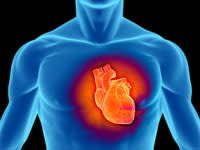How cholesterol affects your heart's health

When most people hear "cholesterol" they think "evil." Like most things in life, the reality is more complex; cholesterol can be very bad and very good. On its own, cholesterol is a crucial body component. That's why you make the white, waxy substance (about 75% of the cholesterol in your blood is made by the liver and cells elsewhere in your body). Cholesterol insulates nerve cells in your brain and provides structure for cell membranes.
"If you want to see what it looks like in a solidified form, go get yourself a can of Crisco at the grocery store," says Gregory Dehmer, MD, director of the division of cardiology at the Texas A&M College of Medicine. "If you open up a can of Crisco, it's this white, lard-like substance."
Health.com: Surprising facts about cholesterol
When it comes to heart disease, though, some types of cholesterol are too much of a good thing.
How cholesterol can clog arteries
Not all cholesterol is created equal. It's a fatty substance, so cholesterol can't dissolve in the blood to be carried to where it's needed in the body. "Your body is mostly water, and fat and water don't mix," says Dr. Dehmer.
So cholesterol is packaged into proteins that can shuttle the fatty stuff around your body. One is high-density lipoprotein (HDL, or good cholesterol) and another is low-density lipoprotein (LDL, or bad cholesterol).
What's the difference? LDL can stick to the smooth lining of the blood vessels, where it is absorbed. HDL appears to do the opposite-it actually mops up excess cholesterol and removes it from the blood vessels.
The amount and type of cholesterol in your blood are determined by genetics, age, diet, and exercise. When you eat a diet that's rich in saturated and trans fats, or dietary cholesterol (which is found in animal products such as eggs, milk, and meat), LDL cholesterol levels go up.
"The problem is that many individuals-and probably including myself-eat a diet that is very excessive in all the wrong kind of fats, of which we are talking about animal fats and dairy fats, and therefore we get our cholesterol up too high," says Dr. Dehmer.
Health.com: 7 causes of high cholesterol
But when you exercise, HDL cholesterol goes up-and that's a good thing. "The bottom line is that there are some people out there who have fairly high levels of HDL cholesterol," says Stephen Nicholls, MBBS, PhD, a research cardiologist at the Cleveland Clinic. "That may drive their total cholesterol to look higher than it actually is in terms of how bad that level is."
How cholesterol affects the heart
If LDL cholesterol is too high, some is absorbed into the artery walls, where it acts like an irritant that triggers inflammation in the body. White blood cells crawl into the artery wall and start "gobbling up fatty particles" in a fruitless effort to heal the damage, says Dr. Dehmer.
The end result is big, fatty deposits in the blood vessels. This causes the vessels to become stiff, narrow, and less responsive to triggers to expand and constrict, a process that ensures a steady flow of life-giving oxygen to the body's tissues. (While you may think of blood vessels as akin to the plumbing in your house, they're more dynamic; they constantly adapt to meet the body's needs.)
This process can happen all over your body. If the fatty buildup is in the blood vessels in the legs (a condition known as peripheral arterial disease), you may experience cramping and have difficulty walking; if it's in the penis, you can develop erectile dysfunction; and if it's in the neck arteries, it can cut off the blood supply to the brain and cause a stroke.
The biggest danger, however, is to the heart. The arteries that cover the surface of the heart are particularly prone to clogging. Once fatty plaques clog these blood vessels, blood flow to the heart tissue is reduced. This can cause chest pain, or angina.
Health.com: What causes clogged arteries?
If plaque ruptures, a clot can form and cause a heart attack-a dramatic decline in the blood supply that causes heart tissue to die.
What you can do about bad cholesterol
The artery-clogging process can start early in life. A 2008 autopsy study of adults ages 16 to 64 who died of non-heart-disease-related causes found that 83% had signs of heart disease and 8% had advanced disease. "We're seeing evidence of abnormality of blood vessels and obvious plaque in teenagers," says Dr. Nicholls.
Health.com: Supplements for cholesterol: What works?
Luckily, there are many things you can do to help prevent this process. "We know that lowering LDL cholesterol, the bad form, is clearly a good thing," says Dr. Nicholls. "The other thing we would highlight is the emerging role of HDL, or good cholesterol, the other player here."
Diet and exercise are critical for lowering LDL and raising HDL, notes Dr. Nicholls.
Health.com: 20 meals that won't kill your cholesterol
Cholesterol-lowering medication can also help, but you still need to watch your diet and exercise. "You can't just say, 'I'm being treated, so I can therefore not exercise and eat whatever I want,'" says Dr. Nicholls. "It doesn't work that way."
